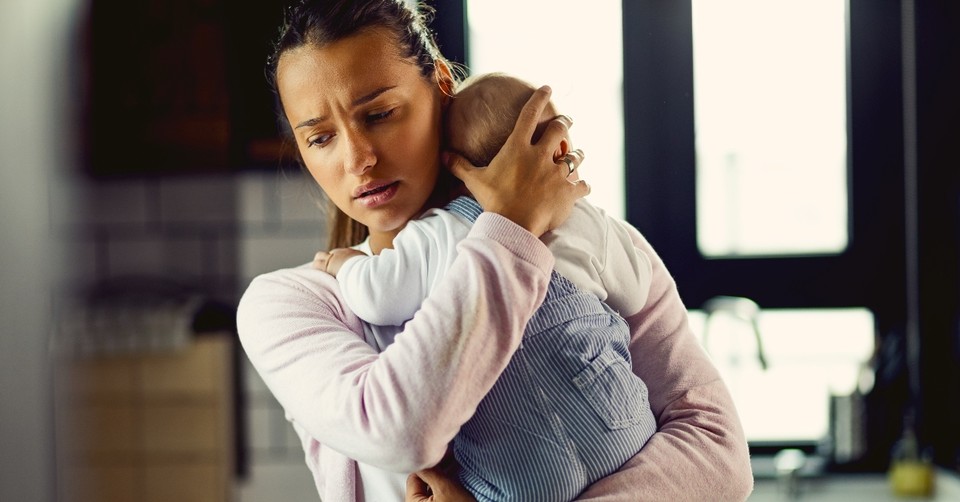5 Tips for Coping with Postpartum Depression

Having a baby is one of the most remarkable experiences in a woman's life. God created your body for this purpose. You most likely have dreamed about it, planned for it, and expected it to be as blissful as the baby food commercials claim. Pregnancy is a wild adventure, but, in the end, it is worth all the pain, tears, and worry as you hold your precious bundle, and you wonder how you could ever love someone so much that you just met. The tiny hands, the tiny feet, and the perfect button nose. You feel a blissful calm as you nurse your baby. Or you don't. Wait, what?
Postpartum depression, also known as "baby blues," is common due to the fluctuating hormones your body is juggling after giving birth. This can include difficulty sleeping, crying spells, anxiety, and mood swings. These can be alarming feelings as they can be unexpected and quite unpleasant. How in the world can you feel anything but abundant joy when you hold your baby? How can you not feel an instant bond with your baby?
There are different levels of postpartum feelings. Beyond baby blues, women can experience postpartum depression. The feelings can range from difficulty bonding with your baby to excessive crying, hopelessness, restlessness, anxiety, and panic attacks. Take a deep breath. This is all very normal. There is nothing wrong with you, and these unpleasant feelings will pass no matter how alarming or horrifying they may be.
But how do you get through them now? Here are five ways to cope with postpartum depression:
1. Build a Strong Bond with Your Baby
Oxytocin, or the "love or happy" hormone, is released when you are in close contact with your baby. These hormones can help alleviate the negative effect of raging hormones. Some simple ways to bond with your baby are skin-to-skin contact, massage, smiling, and singing. Even if you aren't feeling the connection you had hoped for with your baby, there is nothing wrong with you and your ability to mother properly. Give yourself grace as your body and emotions have been through the wringer with pregnancy and labor. The connection may take time, but pushing through and giving your baby what they need will help build the bond and heal your hormones.
2. Make Self Care a Priority
It's the age-old notion of putting on your own oxygen mask before assisting others. The same applies to motherhood and the first days, weeks, and months of motherhood. If you neglect yourself, you won't have the capacity to care for your baby properly. Some ways you can care for yourself are eating a clean, healthy diet loaded with omega-three fatty acids. This can be found in oily fish such as salmon. There are also many beneficial supplements. Be sure they are pure without any added ingredients. Studies show this may lessen the effect of postpartum depression.
Sleep when the baby sleeps. Some mothers can have a surge of adrenaline, giving them the energy to clean or fold laundry. At the same time, other mothers can't keep their eyes open. Either way, it is important that you get the rest you need. Your body has been through a lot, and you need to allow it to rest and heal.
Go outside. Sunshine is so beneficial! If it is winter and gray, it can still lift your mood to leave the house, even just for a bit. Either take the baby in a stroller and walk, even if it's just to the end of the driveway and back. Just this little bit of activity will boost your mood.
3. Reach Out to Friends, Family, and Your Doctor
Fluctuating hormones during postpartum can be overwhelming and, at times, super scary. Don't hesitate to reach out to your closest loved ones and let them know you are struggling. What you are experiencing is very real. Don't fear being judged or looked at as an inadequate mother. If you are reaching out for help, that is the best thing you can do for yourself and your baby. Tell your doctor, allow them to walk you through your symptoms and feelings. Be honest and open about any strange thoughts. I experienced terrifying thoughts after my first baby. I kept it in and suffered alone. I don't recommend this. I believe that my experience was prolonged because I didn't take action to get help. You will feel better even saying it aloud and allowing someone into your mind space. You have people that love you; allow them to help.
4. Be Active
I get it. You just perhaps had a baby, and the last thing your body will let you do is go for a run. Getting active doesn't need to be intense. Get the go-ahead from your doctor and give yourself an opportunity to move. Even if it is just tiny stretches or yoga poses on the floor, getting the blood flowing in your body will benefit you and your baby. Movement can release stress, boost energy, and help you sleep better at night. Over time you may be able to work into doing a simple online exercise routine or going for a walk. If you don't have the time or resources to hit the gym, there are many online resources for working out that you can do from the comfort of your home. Just get moving, no matter what it looks like. Your body and your baby will thank you.
5. PRAY - Yourself or Get Prayer from Family and Friends
This is listed last, but it certainly is not the least. The Lord does not want you experiencing these unpleasant emotions as you hold your new blessing. Invite the Lord into your struggle. Allow him to heal you and give you hope. He is our rock and our redeemer. He understands your struggle intimately. He understands what your body is going through and how your hormones are wreaking havoc on your body and mind. Ask the Lord to fill you with peace, and He will show up. He may lead you to get help from medication or psychotherapy if your symptoms are severe but always include the Lord in all you are dealing with. He will give you guidance and direction for the best care and treatment for you and your baby.
Hormones are a very real thing. When we get taken over by them, especially after having a baby, our minds can play tricks on us, making us feel like it is our fault or that something is wrong with us. This could not be farther from the truth. The Lord created our bodies, and He understands them. Although it can feel like it is against us, our body is the source of comfort and bonding for you and your baby.
*In severe cases of suicidal thoughts or thoughts of hurting your baby, reach out to your healthcare provider or a trusted therapist. Don't be afraid to tell someone. I experienced this with my first baby. I was terrified to tell anyone because I did not want someone to take away my baby. I didn't understand how common and normal these feelings can be and that if I had reached out, I would have received help. Don't suffer alone! There is help!
Related articles:
A Prayer for the Mom Struggling with Postpartum Depression
How to Seek Community as a New Mom
Photo credit: ©Getty Images/Drazen Zigic
Heidi Vegh is a writer, speaker, and ministry leader living in Western Washington. She is a remarried mother of four, navigating the blended family life after the loss of her first husband to cancer in 2013. She longs to use her writing as a way to encourage others who have experienced loss and guide them on the road to healing. She contributes to her blog found at www.mrsheidivegh.com , sharing stories and devotionals of faith stemming from her loss and healing, mothering, and her blended and complex family. She graduated from Southern New Hampshire University with a degree in Creative Writing and English and is working on her first book. Heidi is the Women’s Ministry Director at her local church and has a deep heart for sharing Jesus with women and encouraging them in their faith walk. When she is not writing, she loves to travel, read, craft, and experiment in the kitchen. Visit her Facebook and Instagram (@mrsheidivegh) to learn more.
Originally published July 02, 2024.







